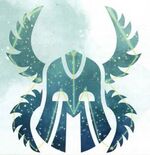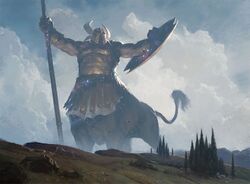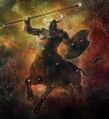Iroas
| Iroas | |
|---|---|
| God of Victory | |
| Information | |
| Colors |
|
| Species | God |
| Birth, Life & Death | |
| Birthplace | Theros |
| Family | |
| Relatives | Mogis (twin brother) |

Iroas (/ɪroʊɑs/, ih-ROH-ahs[1]) is the god of victory, honor, and warfare on Theros. He is associated with white and red mana. Iroas represents the valorous and disciplined aspects of combat, in contrast to his twin brother, Mogis, who embodies carnage and brutality. He is revered as the patron deity of Akros and is closely tied to its civic and military life, as well as its athletic traditions.
Description
Iroas is the god of honorable war, personal courage, and triumphant competition. He governs not only military valor but also athletic excellence, and his ideals are deeply ingrained in Akroan society. He is often depicted as a massive centaur with a bull's lower body instead of a horse's, symbolizing strength, resilience, and dominance. He is clad in gleaming armor and armed like a Greek hoplite, wielding a long dory spear in his right hand and bearing a shield named Philomachos on his left arm. His shield features twin crescent notches and resembles a Boeotian shield more than the traditional aspis. Iroas speaks with a booming, commanding baritone and carries himself with discipline and authority.[2]
He is bold, stoic, and proud, embodying a soldier's bearing and martial poise. While he tends toward seriousness, Iroas is not without a sense of dry humor. He respects courage, discipline, and loyalty. Cowards, traitors, and oath-breakers are held in contempt, and those who fight honorably in his name are said to have his support.
Iroas values strength and determination even in non-lethal pursuits. Sports and physical competition are seen as proxies for warfare, and victory achieved through skill and effort is sacred to him. He established the Iroan Games in Akros to celebrate these ideals, and to participate in the games is considered a great honor.
Influence
Iroas personifies the noble aspects of conflict: bravery, duty, discipline, and the shared camaraderie of soldiers. He is the divine patron of those who fight just causes and those who strive to better themselves through physical training and skill. His influence is most prominent in Akros, where military and civil laws reflect his teachings. He encourages his followers to meet challenges head-on and to prepare themselves mentally and physically for the hardships of war.[2]
Though Iroas believes war is inherently tragic, he sees it as necessary. He expects his followers to fight with purpose and restraint, reserving violence for just causes and conducting themselves with dignity on the battlefield.
Goals
Iroas believes life is a sequence of trials to be overcome through courage and perseverance. He urges his followers to be ever-vigilant and ready for conflict, and to hone their minds and bodies for the challenges ahead. His rivalry with Mogis, who seeks only destruction and savagery, shapes much of his doctrine. Iroas’s primary goal is to ensure that war remains a domain of discipline and honor, not chaos and butchery.
Divine Relationships
Iroas is defined by his opposition to Mogis. While both deities are connected to war, Iroas represents valor and moral purpose, whereas Mogis revels in cruelty and senseless slaughter. The enmity between them is intense and often violent.
Iroas respects Purphoros for his craftsmanship, especially when it comes to finely made weapons. However, he disapproves of Purphoros’s emotional instability, finding it unbecoming for someone whose work is so essential to warfare.
He also allies with Heliod, sharing a belief in justice and order. While Heliod can be arrogant and impulsive, Iroas often serves as a voice of reason, counseling restraint when tempers flare.
Worship
Iroas’s followers show devotion through action rather than ceremony. Competence in battle, dedication to training, and excellence in contests are all forms of worship. Oaths made in Iroas’s name are binding and never taken lightly—failing to uphold them is a grave dishonor.
In Akros, Iroas is honored year-round, but especially during the month known as Iroagonion. This month features the Iroan Games, the greatest athletic contest in Theros. To even qualify is a mark of distinction, as each polis sends only its best. Victors receive ceremonial wreaths and, on rare occasions, a personal appearance or blessing from Iroas himself.[2]
History
Like the other gods of Theros, Iroas was affected by the Silence of the Gods, a period during which the deities were unable to directly intervene in mortal affairs. This temporary loss of divine influence created challenges for his worshippers and exposed Theros to mortal and divine threats alike.[3]
Inspiration
Iroas is inspired in part by figures from classical mythology. His role as a war god with a code of honor resembles Athena and Nike, the Greek goddesses of strategic warfare and victory. His centaur form, especially his connection to physical discipline and mentorship, may draw from Chiron, the wise centaur of Greek myth. His name likely comes from the Modern Greek word ήρωας (íroas), meaning "hero".
Gallery
-
Mogis and Iroas
Story appearances
In-game references
- Represented in:
- Associated cards:
- Depicted in:
- Quoted or referred to:
External links
- The Magic Creative Team (April 02, 2014). "Planeswalker's Guide to Journey into Nyx". magicthegathering.com. Wizards of the Coast. Archived from the original on 2020-11-12.
- Trick Jarrett (May 02, 2014). "Dictate of the Twin Gods". magicthegathering.com. Wizards of the Coast. Archived from the original on 2020-12-02.
References
- ↑ Wizards of the Coast (September 26, 2013). "Theran Pronunciation Quiz". magicthegathering.com. Wizards of the Coast. Archived from the original on 2021-04-30.
- ↑ a b c Wizards RPG Team (2020), D&D Mythic Odysseys of Theros, Wizards of the Coast
- ↑ Jenna Helland (April 2014). Theros: Godsend, Part I. Wizards of the Coast. ISBN 978-0-7869-6556-4.


